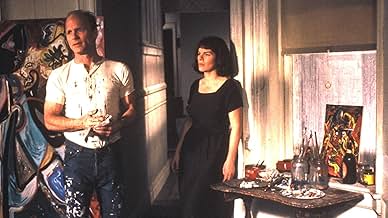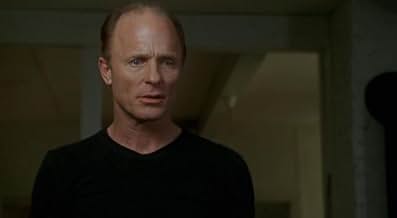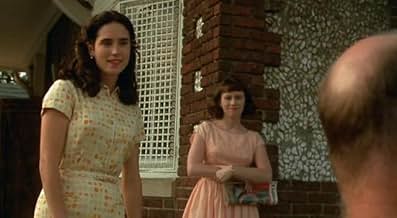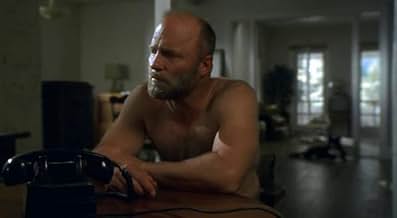A film about the life and career of the American painter, Jackson Pollock.A film about the life and career of the American painter, Jackson Pollock.A film about the life and career of the American painter, Jackson Pollock.
- Won 1 Oscar
- 3 wins & 10 nominations total
Eulala Scheel
- Arloie's Baby
- (as Eulala Grace Harden)
Featured reviews
10L8nDA
Ed Harris has taken the biopic to a new level. Although the skeleton of the film is no more than the troubled life of an alcoholic struggling with fame, the power of the acting and sequence of the film take it a step further. The relationship between Krasner and Pollock mirrors that of Stanley and Stella Kowalski but Krasner is a much stronger character and Marcia Gay Harden more than deserved the oscar she received for the part. The only part that concerned me was the explanation Harris chose to show Pollock's progression to his drip paintings. The arbitrariness of the "revelation" seems stretched to me and suggests that it is actually known how Pollock made that movement. All in all, the movie is excellent and worth seeing.
Just be careful - I cringed every time he got into a car...
Just be careful - I cringed every time he got into a car...
10jhclues
The romantic notion of suffering for one's art has been cinematically rendered in countless films, depicting the lives of real life artists ranging from Van Gogh to Camille Claudel to Beethoven to Jim Morrison to Rimbaud; but rarely has a film penetrated as deeply as `Pollock,' directed by and starring Ed Harris as the abstract painter Jackson Pollock. The story begins in 1941 and chronicles Pollock's life until the early 50s. It's a vivid, and at times grim portrait of a true artist struggling for recognition, as well as with the inner demons that plague his soul and are reflected in his art and the way he lives his life. It is said that the artist `sees' the world differently than the average person, which may be true; and it is that unique `vision' that sets the artist apart. And Pollock was no exception to the rule.
As romantic as it may sound, the reality of suffering for one's art is just that: Suffering. For realizing that vision and bringing it to fruition is more often than not an arduous and tortuous path to tread. Coalescing the fragments of that vision and transferring that information into reality can be a painful process, and one of the strengths of this film is that it so succinctly conveys that sense of desperation and frustration that are seemingly an intrinsic part of `creating.' There's a scene in which Pollock, after having been commissioned to do a mural, sits on the floor of his studio with his back against the wall staring for days on end at the blank canvas stretched across the room, waiting for that spark of inspiration, that sudden moment when what he must do will crystallize in his mind's eye. It's a powerful, intense scene that allows you to share that creative process with the artist and experience the emotional turmoil of it, as well as the exhilaration of the moment when it all suddenly becomes clear, when the vision is realized. It's a stunning moment; Pollock's face fills the screen and you actually see it in his eyes, the exact moment of discovery. And it's absolute magic.
As Pollock, Ed Harris gives arguably the best performance of his career; he perfectly captures every emotional level of this complex individual, from the manic highs and lows (exacerbated by alcohol consumption) to the neutral moments in between. He totally immerses himself in the character, and what surfaces is a thorough and memorable picture of a tortured genius and flawed human being. It's an astounding piece of work, for which he most certainly should have taken home the Oscar for Best Actor.
Marcia Gay Harden received the Academy Award for Best Supporting Actress for her portrayal of Lee Krasner, the woman who loved Pollock and devoted herself (even at the expense of her own career as an artist) to the man and his art. It's a terrific performance, through which Harden brings Lee to life, physically and emotionally. Her amount of screen time seemingly should have qualified her for a Best Actress nomination, but regardless, her work here is unquestionably deserving of the Oscar.
The supporting cast includes Amy Madigan (Peggy Guggenheim), Jennifer Connelly (Ruth), Jeffrey Tambor (Clement), Bud Cort (Howard), John Heard (Tony), Sada Thompson (Stella Pollock) and Val Kilmer (Willem de Kooning). Harris' triumph with `Pollock' does not begin and end with his extraordinary performance, however; though his acting is so exceptional it would be easy to overlook the brilliant job of directing he did with this film. And it is brilliant. The way this film is presented is the work of not only a seasoned professional, but of a professional artist with a unique vision of his own. One of the best films of the year (2000), hopefully it will in the future receive the acclaim of which it is so richly deserving. Hopefully, as well, Harris will direct again; for it is talent like his, and films like this one, that expand the Cinematic Universe as we know it. I rate this one 10/10.
As romantic as it may sound, the reality of suffering for one's art is just that: Suffering. For realizing that vision and bringing it to fruition is more often than not an arduous and tortuous path to tread. Coalescing the fragments of that vision and transferring that information into reality can be a painful process, and one of the strengths of this film is that it so succinctly conveys that sense of desperation and frustration that are seemingly an intrinsic part of `creating.' There's a scene in which Pollock, after having been commissioned to do a mural, sits on the floor of his studio with his back against the wall staring for days on end at the blank canvas stretched across the room, waiting for that spark of inspiration, that sudden moment when what he must do will crystallize in his mind's eye. It's a powerful, intense scene that allows you to share that creative process with the artist and experience the emotional turmoil of it, as well as the exhilaration of the moment when it all suddenly becomes clear, when the vision is realized. It's a stunning moment; Pollock's face fills the screen and you actually see it in his eyes, the exact moment of discovery. And it's absolute magic.
As Pollock, Ed Harris gives arguably the best performance of his career; he perfectly captures every emotional level of this complex individual, from the manic highs and lows (exacerbated by alcohol consumption) to the neutral moments in between. He totally immerses himself in the character, and what surfaces is a thorough and memorable picture of a tortured genius and flawed human being. It's an astounding piece of work, for which he most certainly should have taken home the Oscar for Best Actor.
Marcia Gay Harden received the Academy Award for Best Supporting Actress for her portrayal of Lee Krasner, the woman who loved Pollock and devoted herself (even at the expense of her own career as an artist) to the man and his art. It's a terrific performance, through which Harden brings Lee to life, physically and emotionally. Her amount of screen time seemingly should have qualified her for a Best Actress nomination, but regardless, her work here is unquestionably deserving of the Oscar.
The supporting cast includes Amy Madigan (Peggy Guggenheim), Jennifer Connelly (Ruth), Jeffrey Tambor (Clement), Bud Cort (Howard), John Heard (Tony), Sada Thompson (Stella Pollock) and Val Kilmer (Willem de Kooning). Harris' triumph with `Pollock' does not begin and end with his extraordinary performance, however; though his acting is so exceptional it would be easy to overlook the brilliant job of directing he did with this film. And it is brilliant. The way this film is presented is the work of not only a seasoned professional, but of a professional artist with a unique vision of his own. One of the best films of the year (2000), hopefully it will in the future receive the acclaim of which it is so richly deserving. Hopefully, as well, Harris will direct again; for it is talent like his, and films like this one, that expand the Cinematic Universe as we know it. I rate this one 10/10.
a good film, though perhaps i was expecting a little more. The psyche of a troubled artist is somewhat predestined these days and maybe it is just that our assumptions are correct as they are all portrayed in a predictable way. If this is how the artist truly was then then Harris could have done nothing different, it just seems a little distant. I didn't feel at one with the artist, i couldn't sympathise with him or feel his pain. The 'intellectual' artistic debates and gendredising continuously used by his wive left me with no sympathy for her. She appears desperate from the first scene pretentiously trying to be involved with the next big thing. The most depressing part of this film is that two people can be stupid enough to waste their lives on each other without searching for the happiness which they truly seek. The emphasis is on Pollock as a man whereas i would like to see more of him as an artist, did his individual paintings have meaning or did he just do them out of hate for the world.... i guess i didn't feel you see his mind and its true agony's, maybe he was just generally mad at the world.
Really not a bad film for what it is, just to me it lacked true emotion.
sio
Really not a bad film for what it is, just to me it lacked true emotion.
sio
Jackson Pollock (Ed Harris) is famous with a Life magazine cover in 1950. The movie flashes back to 1941. He's a drunk staying in Greenwich Village with his brother and pregnant wife. Artist Lee Krasner (Marcia Gay Harden) shows some interest and becomes his lover/supporter. His brother moves to Connecticut. Jackson breaks down which is why he can't be drafted into the war. Lee takes Jackson home acting more and more like his manager. His work eventually gains the attention of art collector Peggy Guggenheim (Amy Madigan) who gives him an one-man show in 1943. Lee and Jackson decides to move to a country house on Long Island away from the drinking and doing more work. His paintings are still not selling and then the Life article happens. Lee and Jackson have a roller-coaster relationship and then he has an affair with Ruth Kligman (Jennifer Connelly).
Ed Harris directs a mostly straight forward biopic of Jackson Pollock with a few fascinating scenes of painting sessions. His directing style doesn't necessarily project Jackson mental breakdowns but his acting is able to bridge the gap. Ed Harris is not the most imaginative director visually but it is overcome by good actors doing good work. It is a good debut directorial effort.
Ed Harris directs a mostly straight forward biopic of Jackson Pollock with a few fascinating scenes of painting sessions. His directing style doesn't necessarily project Jackson mental breakdowns but his acting is able to bridge the gap. Ed Harris is not the most imaginative director visually but it is overcome by good actors doing good work. It is a good debut directorial effort.
Pollock (2000)
There's no question this is a well made film, and based pretty much on truth, and an interesting truth--the life of a great Abstract Expressionist. Some would say the greatest of them all.
For myself, this isn't enough, and I know this is me. I'm an art critic and professor of Art in my real life, and I'm never very patient with movies about artists. The reason isn't that there are inaccuracies, but that there is a subtle or not-subtle goal of aggrandizing the subject. This reaches a beautiful but, again, romanticized, peak when Pollock makes his famous break into true gestural, raw work in a large commissioned piece for Peggy Guggenheim (who is portrayed, oddly, as a shy and dull sort, which I've never pictured). Then later he makes his drip works. And then he dies, again over dramatized and made aesthetic, as tragic and ugly as it had to have been in life.
If you want to really get into Pollock's head, especially if you aren't already a fan (I love Pollock's work), this is a convincing movie. At the helm as both director and playing the artist is Ed Harris. He is especially believable as a painter, which is something of an important point. This isn't like those movies about musicians where the actor is clearly not playing. Harris actually paints the darned thing, the big masterpiece, on the cusp of the drip works. I don't know if Harris was drinking, too, but he's a good drunk, and of course Pollock was a better drinker than a painter, even.
It's a cheap shot to say a movie could have been shorter, but this one sure would have propelled better with less atmosphere, less filler that is meant to create his life but is interesting only as an illustration of historical facts. It wore me thin for those reasons. Again, it might be a matter of how much you can get sucked into the given drama that is Jackson Pollock's life. It was quite a life, crude, untempered, brave, and immensely connected to what matters as an artist.
There's no question this is a well made film, and based pretty much on truth, and an interesting truth--the life of a great Abstract Expressionist. Some would say the greatest of them all.
For myself, this isn't enough, and I know this is me. I'm an art critic and professor of Art in my real life, and I'm never very patient with movies about artists. The reason isn't that there are inaccuracies, but that there is a subtle or not-subtle goal of aggrandizing the subject. This reaches a beautiful but, again, romanticized, peak when Pollock makes his famous break into true gestural, raw work in a large commissioned piece for Peggy Guggenheim (who is portrayed, oddly, as a shy and dull sort, which I've never pictured). Then later he makes his drip works. And then he dies, again over dramatized and made aesthetic, as tragic and ugly as it had to have been in life.
If you want to really get into Pollock's head, especially if you aren't already a fan (I love Pollock's work), this is a convincing movie. At the helm as both director and playing the artist is Ed Harris. He is especially believable as a painter, which is something of an important point. This isn't like those movies about musicians where the actor is clearly not playing. Harris actually paints the darned thing, the big masterpiece, on the cusp of the drip works. I don't know if Harris was drinking, too, but he's a good drunk, and of course Pollock was a better drinker than a painter, even.
It's a cheap shot to say a movie could have been shorter, but this one sure would have propelled better with less atmosphere, less filler that is meant to create his life but is interesting only as an illustration of historical facts. It wore me thin for those reasons. Again, it might be a matter of how much you can get sucked into the given drama that is Jackson Pollock's life. It was quite a life, crude, untempered, brave, and immensely connected to what matters as an artist.
Did you know
- TriviaEd Harris's father, Bob L. Harris, bought his son a book about Jackson Pollock simply because he felt Ed bore a strong resemblance to the painter. Ever since then, Ed Harris became fascinated with Pollock's life.
- GoofsWhen the photographer is making the movie of Pollock, he "zooms" in on the shoes. But the old 16 mm camera he is using has a turret with three fixed lenses; thus, he should not be able to zoom. All his other shots are as expected from fixed lenses of different focal lengths.
- Quotes
Jackson Pollock: If people would just look at the paintings, I don't think they would have any trouble enjoying them. It's like looking at a bed of flowers, you don't tear your hair out over what it means.
- SoundtracksThe Mighty Blues
Improvisation
Performed by The Port of Harlem Jazzmen
Courtesy of Blue Note Records
By Arrangement with EMI Capitol Music Special Markets
- How long is Pollock?Powered by Alexa
Details
Box office
- Budget
- $6,000,000 (estimated)
- Gross US & Canada
- $8,598,593
- Opening weekend US & Canada
- $44,244
- Dec 17, 2000
- Gross worldwide
- $10,994,533
- Runtime
- 2h 2m(122 min)
- Color
- Sound mix
- Aspect ratio
- 1.85 : 1
Contribute to this page
Suggest an edit or add missing content






































